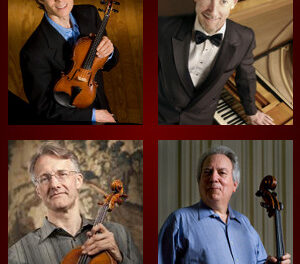There is so much musical talent hidden away, teaching at the less-prestigious colleges and conservatories that dot this large country. Who would have thought that a Wichita State University professor of piano would give one of the most cerebral but simultaneously enjoyable concerts I have heard this year. An audience of about sixty, including perhaps twenty music students, attended this recital by Julie Bees in the Thomas Auditorium of Blue Ridge Community College. The program included works by Mozart, Brahms and Chopin.
Wolfgang Amadeus Mozart’s Sonata in D, K. 576, opened the program. Julie Bees has a distinctive and personal approach to Mozart. She made a fearless use of rubato to explicate the Allegro. The Adagio was dotted with agogic accents (deliberate hesitations), each meaningful and proper. Her contrasts in the Trio (especially between her legato and non legato) were superb. The Allegretto was delivered more straightforwardly (more like your average pianist) but with excellent articulation. She had not just presented us with the familiar sonata; she had led us to explore its depth.
Performers often pick and choose among Johannes Brahms’s piano works to create their own idiosyncratic suite. Not Julie Bees. She presented Brahms’s Opus 118 Klavierstücke just as the composer had given it to us: six pieces (four intermezzos, a ballade and a romanze) as a connected unit. There were moments of Hungarian bravado and interludes of extreme introspection. When Bees fell into a sotto voce whisper for a repeated passage at one point, there was not a rustle to be heard in the hall. The audience was enrapt. With skilful pedal work, the artist concluded the suite with a slowly decaying resonance of some of Brahms’s complex inner-voice harmony.
Frédéric Chopin published no fewer than 57 mazurkas; the form was clearly a favorite of the composer. Artur Rubinstein claimed that no one but a Pole could play a mazurka correctly. He probably had in mind the rhythmic complexities; Giacomo Meyerbeer once complained to Chopin that “you write mazurkas in 3/4 time but you play them in 4/4.” Julie Bees clearly demonstrated that Rubinstein was wrong and that Meyerbeer was almost right. Her performance of the four Opus 24 mazurkas was exemplary, introspective and athletic by turn.
Chopin’s Ballades No. 2 and No. 4 (Opus 38 in F and Opus 52 in F minor) completed the program. Bees managed fiery attacks with an economy of motion – no extraneous body language for the benefit of the audience, simply arms descending from on high to provide power.
As an encore, Bees performed Scriabin’s Nocturne for the left hand. I have to think that this was a tribute to her one-time teacher Leon Fleisher, who for forty years lost the use of his right hand. Like Fleisher, Julie Bees displays individuality and conviction in her approach to music.











